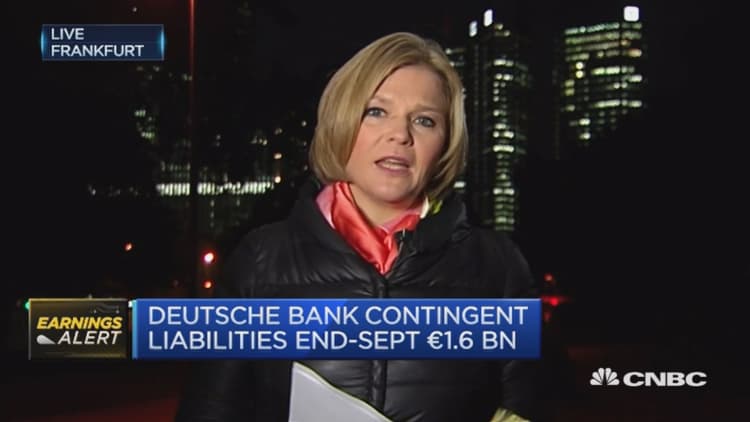
Deutsche Bank, the troubled German lender, announced better-than-expected revenue and income for its third quarter on Thursday, helping to alleviate concerns over its litigation issues and its current capital position.
The embattled bank and an important part of the global financial system announced third-quarter net income of 278 million euros ($303 million), which compares favorably to a 6 billion euro loss for the same period a year ago. The number also beat market expectations, as did revenues which came in at 7.49 billion euros ($8.17 billion).
It noted improved bond trading in the quarter — a trend seen across the whole banking sector, especially in the U.S. — and the results also showed that it raised its legal provisions slightly to 5.9 billion euros by the end of September. Shares of the firm rose 3 percent as the European trading session began on Thursday but quickly trimmed gains to trade flat.
'Working hard on achieving a resolution'

The fresh results come after a roller-coaster ride for its share price in recent weeks after the U.S. Justice Department (DOJ) suggested it pay $14 billion to settle a number of investigations related to mortgage securities.
"The results for the quarter demonstrate well the strengths of our operating businesses and the outstanding work of our people. We continued to make good progress on restructuring the bank," CEO John Cryan said in the earnings report.
"However, in the past several weeks, these positive developments were overshadowed by the attention around our negotiations concerning the Residential Mortgage Backed Securities matter in the United States. This had an unsettling effect. The bank is working hard on achieving a resolution of this issue as soon as possible," he added.
'Market was forecasting a loss'
The market expectation is that Deutsche Bank needs to raise cash to pay the penalty, which is still yet to be resolved. This has also led to speculation that the German government could intervene to help prop up the bank, although officials have denied that they are working on a rescue plan.
Initial worries about Deutsche Bank actually surfaced earlier in the year, with investors detailing concerns over its exposure to the energy sector and a possible cash crunch. In July, the bank announced that its second-quarter net income was down 98 percent from the same period in the previous year, to 20 million euros ($22 million),
The bank has repeatedly defended itself over recent weeks, however, telling CNBC that there was "no reason to worry" and that the bank had a "comfortable cushion." Deutsche Bank's stock has slid over 41 percent so far this year and the cost of insuring exposure to its debt has risen sharply. It has come under pressure from aggressive short-selling, notably from some large hedge funds.
Speaking on the increased litigation reserves, Paul Kavanagh, CEO at Patronus Partners, told CNBC Thursday that the bank not try to preempt the amount of the final settlement with the DOJ by increasing their reserves.
"So the way they have moved their reserves number today has two meanings — one is that it actually means nothing in relation to the conversation that is in focus and second this sort of slightly lower increase in provision rate expected in (the third quarter) has meant that they are able to report a small operating profit in (the third quarter) whereas the market was forecasting a loss," he said.
Liquidity reserves
The company is still in the midst of a restructuring plan announced last year. This involves around 4,000 job cuts in Germany, which is part of 9,000 role reductions worldwide. It also recently announced it had sold its British insurance business Abbey Life to Phoenix Group Holdings.
Its second-quarter earnings - released in July - showed it has liquidity reserves of around 220 billion euros ($246 billion) and a liquidity coverage ratio (LCR) of around 120 percent.
This LCR is a regulatory measure designed to ensure a lender has a decent stock of high-quality liquid assets (HQLA) which can be sold without loss to meet its 30-day liquidity requirements under a stress scenario. In its third-quarter earnings on Thursday this LCR remained at 122 percent and the reserves amounted to 200 billion euros as of September 30, 2016, it said.


